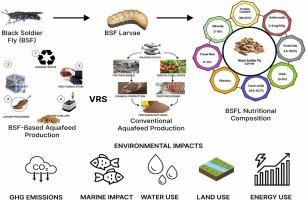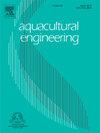革命性的水产养殖饲料:对黑兵蝇利用的见解
IF 4.3
2区 农林科学
Q2 AGRICULTURAL ENGINEERING
引用次数: 0
摘要
黑兵蝇(Hermetia illucens)正在成为传统水产饲料蛋白质的可持续替代品。本文综述了在营养、加工、自动化和环境系统中利用生物流化床的最新进展。关键的加工方法,如脱脂、挤压和高级干燥,评估了它们对营养保留、消化率和颗粒质量的影响。智能基础设施的作用,包括自动化和实时监控,被认为是可扩展的BSF农业的必要条件。通过生命周期分析和循环经济模型来评估环境效益,强调生物流化床对有机废物的增值能力。挑战,如基材可变性,生产标准化和废物管理,从工程和生物学的角度解决。新兴的策略,如微生物群信息饲料设计和系统特定优化强调了综合方法的必要性。这篇综述认为,生物蛋白不仅是一种可持续的饲料成分,而且是水产养殖、生物技术和环境工程交叉领域创新的驱动力。本文章由计算机程序翻译,如有差异,请以英文原文为准。

Revolutionizing aquaculture feeds: insights into black soldier fly utilization
The Black Soldier Fly (Hermetia illucens) is emerging as a sustainable alternative to conventional aquafeed proteins. This review integrates recent advances in BSF utilization across nutrition, processing, automation, and environmental systems. Key processing methods such as defatting, extrusion, and advanced drying are evaluated for their impact on nutrient retention, digestibility, and pellet quality. The role of smart infrastructure, including automation and real-time monitoring, is discussed as essential for scalable BSF farming. Environmental benefits are assessed through life cycle analyses and circular economy models, highlighting BSF’s capacity to valorise organic waste. Challenges such as substrate variability, production standardization, and waste management are addressed from both engineering and biological perspectives. Emerging strategies such as microbiome-informed feed design and system-specific optimization underscore the need for integrated approaches. This review positions BSF not only as a sustainable feed component but also as a driver of innovation at the intersection of aquaculture, biotechnology, and environmental engineering.
求助全文
通过发布文献求助,成功后即可免费获取论文全文。
去求助
来源期刊

Aquacultural Engineering
农林科学-农业工程
CiteScore
8.60
自引率
10.00%
发文量
63
审稿时长
>24 weeks
期刊介绍:
Aquacultural Engineering is concerned with the design and development of effective aquacultural systems for marine and freshwater facilities. The journal aims to apply the knowledge gained from basic research which potentially can be translated into commercial operations.
Problems of scale-up and application of research data involve many parameters, both physical and biological, making it difficult to anticipate the interaction between the unit processes and the cultured animals. Aquacultural Engineering aims to develop this bioengineering interface for aquaculture and welcomes contributions in the following areas:
– Engineering and design of aquaculture facilities
– Engineering-based research studies
– Construction experience and techniques
– In-service experience, commissioning, operation
– Materials selection and their uses
– Quantification of biological data and constraints
 求助内容:
求助内容: 应助结果提醒方式:
应助结果提醒方式:


